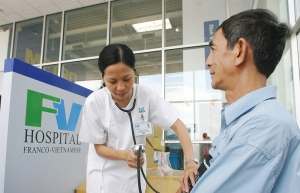Partnership key to improving healthcare in Vietnam
Vietnam is making efforts to improve the health system, thus contributing to better taking care of people. What is the role of stakeholders in this?
 |
| Nguyen Thi An, country director of HealthBridge |
All stakeholders have their own role. They should work on the principle of doing whatever is beneficial for people and improving their health status.
At Healthbridge, we provide information, scientific evidence, and international experience so that policymakers and people can be aware of and reduce health risk factors, and avoid mistakes for countries during the implementation.
For example, regarding e-cigarettes, as there is a high prevalence of children and young people using e-cigarettes, we share information and scientific evidence on the harmful effects of these products, as well as best practices and lessons learnt from other countries so that Vietnam can consider and make informed decisions.
We work with government agencies to develop relevant technical guidelines to follow on enhancing the protection, care, and improvement of people’s health, which focuses on building an effective health system. We are willing to contribute to the healthcare sector in this.
What lessons should Vietnam learn from other countries in improving the health system?
Some countries in the region have succeeded in developing their healthcare systems, thus increasing healthcare accessibility and quality.
One of the factors for success is to have ample and sustainable funding for preventive health. We cannot realise any good policies without money.
In Thailand, the country does it very well because it has a sustainable and large budget for prevention. This is taken from the taxes imposed on products harmful to people’s health for the Thai Health Fund.
It is similar in the Philippines, which takes money with a sin tax to cover health insurance for the poor.
In addition, the medical workforce plays an important role. It is necessary to strengthen training at all levels, starting with grassroots healthcare as the foundation.
At present, grassroots healthcare in many areas of the country is not good enough, so people tend to seek services at central-level health facilities, thus causing overloads.
We also focus on investing in science and technology in treatment and disease prevention. Telemedicine, and remote consultation between local and higher levels, can increase the efficiency of lower-level healthcare and grassroots healthcare.
It is necessary to build a database information system so that we can build the right strategies. For example, with a database on weight and obesity in particular, the government can develop a suitable and effective strategy to tackle the issue.
What were the highlights for HealthBridge in Vietnam in 2023, and what is your focus for this year?
Last year marked an important milestone, our 30-year anniversary in Vietnam. We have received recognition for our journey here, and have certificates of merit from the Vietnam Union of Friendship Organizations for sustainable development.
We collaborate with government agencies to carry out various programmes. For instance, we worked with the Ministry of Health on develop technical guidance on communication on adolescent reproductive health. The ministry then decided to use it as the national guideline and shared it with all provinces and cities.
We also work closely with the ministry in tobacco control and non-communicable disease prevention.
Furthermore, we have worked with the Ministry of Construction and other partners on developing technical guidance on bicycle safety infrastructure.
Not only that, but we are proud to develop models in collaboration with local partners, such as a safe traffic model in front of school gates, and a smoke-free restaurant model.
We have scaled up, shared, and replicated our work. Our key areas are tobacco control and non-communicable diseases prevention, liveable cities, nutrition, and maternal and child healthcare.
In the upcoming time, we will focus on these programmes, while possibly expanding on how climate change affects health as a cross-cutting area of intervention.
 | Healthcare welcomes essential reforms Pharmaceuticals are an indispensable element in disease prevention and treatment. Three years ago, the global health industry faced huge challenges due to the pandemic. If the world’s pharma industry did not promptly carry out its research and produce vaccines, we could not imagine what the situation would be now for people’s health and livelihoods. |
 | Healthcare service quality must meet global standards Vietnam is actively improving the quality of medical services at hospitals towards meeting international standards, aiming to engage foreigners for medical examination and treatment here. |
 | Private healthcare boosts its presence Together with expansion plans among foreign-invested enterprises, emerging private players are boosting their presence in the promising local healthcare market. |
What the stars mean:
★ Poor ★ ★ Promising ★★★ Good ★★★★ Very good ★★★★★ Exceptional
Themes: Healthcare Platform
- PM outlines new tasks for healthcare sector
- Opella and Long Chau join forces to enhance digestive and bone health
- Hanoi intensifies airport monitoring amid Nipah disease risks
- Cosmetics rules set for overhaul under draft decree
- Policy obstacles being addressed in drug licensing and renewal
Related Contents
Latest News
More News
- PM outlines new tasks for healthcare sector (February 25, 2026 | 16:00)
- Ho Chi Minh City launches plan for innovation and digital transformation (February 25, 2026 | 09:00)
- Vietnam sets ambitious dairy growth targets (February 24, 2026 | 18:00)
- Masan Consumer names new deputy CEO to drive foods and beverages growth (February 23, 2026 | 20:52)
- Myriad risks ahead, but ones Vietnam can confront (February 20, 2026 | 15:02)
- Vietnam making the leap into AI and semiconductors (February 20, 2026 | 09:37)
- Funding must be activated for semiconductor success (February 20, 2026 | 09:20)
- Resilience as new benchmark for smarter infrastructure (February 19, 2026 | 20:35)
- A golden time to shine within ASEAN (February 19, 2026 | 20:22)
- Vietnam’s pivotal year for advancing sustainability (February 19, 2026 | 08:44)

 Tag:
Tag:


















 Mobile Version
Mobile Version